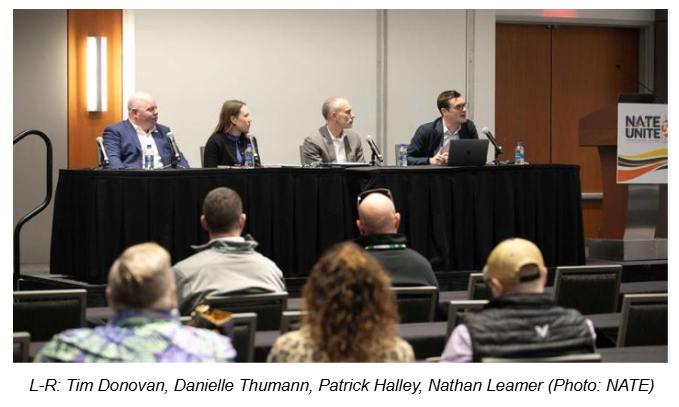With around 2,000 attendees, the NATE UNITE 2025 conference got underway on Tuesday with a full program of topics and discussions that are particularly relevant to communications contractors in the current political and economic environment. In one session entitled, ‘Legislative and Regulatory Trends: Navigating Policy Changes in Washington and Their Impact on Your Business’, a panel of D.C. insiders, moderated by Nathan Leamer of Fixed Gear Strategies, included Tim Donovan, President and CEO at Competitive Carriers Association, Danielle Thumann of FCC Chairman Brendan Carr’s office and Patrick Halley, President and CEO of the Wireless Infrastructure Association.
The panel talked about the power and influence that associations like NATE have in D.C. and the impact that NATE’s communications contractor member stories have on policy and legislation. NATE points out that it was one of many associations that vigorously advocated for the ‘Rip and Replace’ program to be fully funded through Congress. That lobbying effort proved successful when Congress finally approved the additional funding needed to complete the program.
“Our members of Congress want to hear your stories. Your stories are what drives legislation like the Rip and Replace program over the finish line,” commented Leamer to a well-attended session.
Another session titled, ‘Customer Diversification: Innovating Beyond Wireless’ panelists shared their own experiences and lessons learned about how to pivot away from working solely in wireless by expanding into adjacent industries such as installing aerial and buried fiber, electrical contracting including EV charging stations, steel and concrete construction and taking on more public sector projects. The panel, moderated by Brett Sorrells, owner of Telogistix, included Scott Wendland, President & CEO of NICX Construction, Nat Mangum CEO of Selective Site Consultants and Mike Young, CEO at ANCO Holdings.
Speaking from their own experiences, the panelists offered a number of practical considerations to an interested audience. One key piece of advice was that in diversifying it is important to “be honest what you’re good at” and not just take any work that comes along.
They emphasized that it’s important to look for niches in which the contractor can develop some knowledge and expertise rather than competing with established companies.
Another tip was that diversification should not be treated as a side business. Moving into other types of contracting work involves substantial capital for acquiring the equipment and tools to do the job, hiring needed skills, and investing time and money to obtain the required certifications and credentials to be able to perform the work. All of this involves making a long-term commitment.
Partnerships or collaborations, even with competitors, offer pathways to becoming established in areas where your company is not known. The panel emphasized the importance of building and nurturing customer relations to establish credibility and trust that ultimately can lead to more profitable work.





Reader Interactions